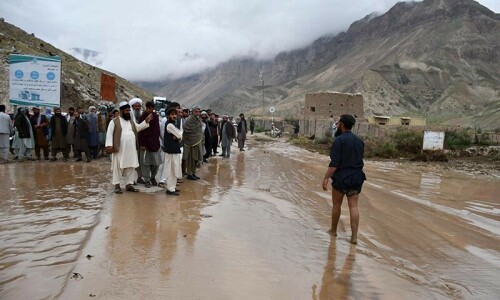ISLAMABAD: The government has approved amending rules relating to Export Processing Zones (EPZs) to allow and facilitate the import of construction goods from local industries to the existing EPZs of Gujranwala and Sialkot in Punjab and Risalpur in Khyber Pakhtunkhwa and all the upcoming EPZs.
The Economic Coordination Committee (ECC) of the Cabinet has cleared the amendments to the Export Processing Zones Authority (EPZA) Rules 1981 and EPZs (Control of Entry and Exit of Persons and Goods) Regulations 1994 for formal approval of the federal cabinet.
The changes in both sets of rules now allow the import of construction material from the tariff area into EPZs of the Northern region (Sialkot, Gujranwala and Risalpur) as well as all future EPZs in local currency instead of foreign convertible currency for their speedy colonisation and achievement of optimum export targets. This would, however, be subject to the condition that this relaxation would be for locally manufactured products by Pakistani entrepreneurs for a period of the next five years.
The amendments had been proposed by the Ministry of Industries and Production (MoIP) at the request of the Sialkot Chamber of Commerce and Industry. The ECC agreed to the request but also allowed its application to Gujranwala and Risalpur EPZs and other future EPZs. The MoIP had told the ECC that Export Processing Zones Authority (EPZA) was established in 1980 through an ordinance and the first EPZ was launched in Karachi in 1981.
Initially, export-oriented units were set up either by foreign investors or non-resident Pakistanis.
Due to the non-availability of locally manufactured construction materials, the infrastructure was built by using imported materials which required filing of Goods Declaration and Encashment Certificate with the zone authority.
So far, eight EPZS have been established in the country including Sialkot Export Processing Zone (SEPZ) which became operational in June 2002. The MoIP said that despite the huge export potential and product surplus, the activity in SEPZ remained slow. Static rules and regulations framed almost four decades ago in 1981 and 1994 (including SRO 1058(10)81 of Sept 23, 1981 and SRO 214 (KE)/94 of Nov 21, 1994) mainly responsible for the slow pace of development work in the EPZs especially SEPZ, it said.
The MoIP also pointed out that the country had developed indigenous manufacturing capacity for the construction material and hence ceasing the reliance on imports. As a result, the investors now opt for locally produced construction materials like iron and steel, cement, ceramics and other components etc., to save foreign exchange exposure and support the industry located in the tariff area of Pakistan.
Published in Dawn, July 26th, 2023













































Dear visitor, the comments section is undergoing an overhaul and will return soon.